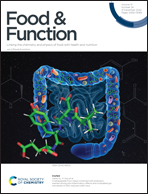Strain-specific effect of Limosilactobacillus fermentum with distinct genetic lineages on loperamide-induced constipation in mice: attributing effects to certain genes
Abstract
In 2013, Limosilactobacillus fermentum was regarded as a “generally recognized as safe” organism by the US Food and Drug Administration, and emerging evidence showed that it can exert beneficial health effects on humans. In this study, five L. fermentum strains from different phylogroups of a phylogenetic tree containing 224 L. fermentum strains were chosen, and their protective effects against loperamide-induced constipation in mice were studied. Animal experiments showed that L. fermentum YN54 significantly alleviated weight loss, increased fecal moisture, accelerated intestinal peristalsis, and increased the small intestinal transit rate in mice with constipation by regulating gastrointestinal peptides and increasing the amount of intestinal short-chain fatty acids. However, the other four L. fermentum strains (XJ61, CECT5716, WX115, and GD121) did not relieve constipation in mice treated with loperamide. A comparative genomic analysis of these strains was conducted and “L. fermentum YN54 only” genes were functionally annotated and validated with the other three L. fermentum strains (FJ12, GX51, and ZH1010) that had different functional genes. Finally, the genes involved in the synthesis of fatty acid hydrase, polysaccharides, and cell membranes were identified to be associated with the probiotic effect of L. fermentum on mice with constipation through preliminary experiments in this study.



 Please wait while we load your content...
Please wait while we load your content...